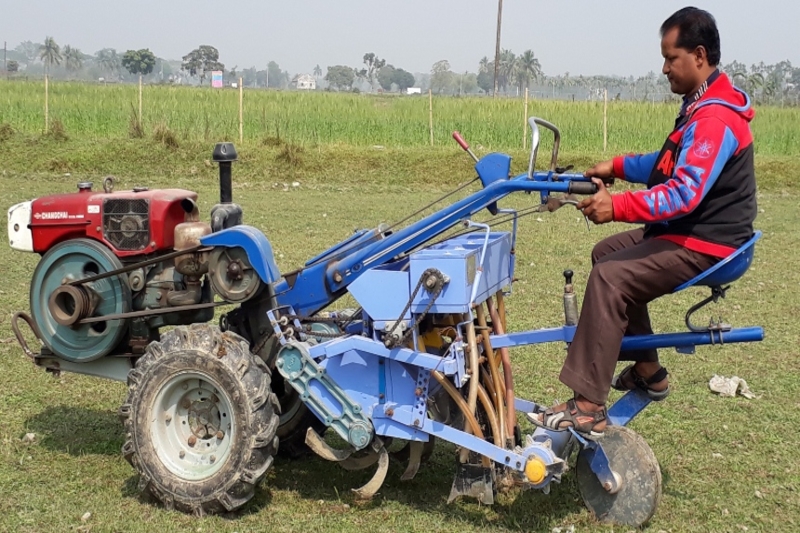
As a professor of Sustainable Land Management at Murdoch, Professor Richard Bell is fifteen years into a research journey that’s transforming agriculture in Bangladesh. The results are changing the lives of farmers, entrepreneurs and their families across the country.
He noted that there are lots of examples of international scientists going to developing countries with bright ideas, which is all very well. “But you’ve got to sit and talk to the local people and get their ideas to develop technology that gets used,” he commented.
Alongside a network of local academics, entrepreneurs and farmers, Professor Bell developed a new system of cropping for small farms and invented the small-scale machinery to make it possible. The team mechanized a system of planting where less than 25% of the soil is disturbed to place seed and fertiliser and keep the remnants of the previous crop in the field as a cover of the soil. It’s a type of agriculture called ‘conservation agriculture’, Professor Bell explained. The technology will help farmers in Bangladesh and, hopefully, other developing nations efficiently sow seed.
This type of cropping has spread to over 170 million hectares worldwide, but 85% of that is in five countries; Australia, Argentina, Brazil, Canada and the United States. Each of these countries has big farms and big machines, making the system easy to implement.
It has been a very profitable technique for the farming industries in these places due to the time and fuel saved, and it has reduced soil erosion. As compared to conventional farming, where you need to plough the soil two to three times and then seed, conservation agriculture requires a single operation for the sowing of seed.
However, the trouble is that this technique hasn’t spread in small farms as it’s not possible to get four-wheel tractors into these areas and big machinery isn’t accessible. Thus, the team is pioneering the system for Bangladesh, where the field sizes are much smaller.
Identifying the opportunity
The Professor first got involved in Bangladesh in 2005 trying to promote pulses – chickpeas and lentils – which are important parts of the national diet. Pulses seemed to be difficult to grow and were disappearing from the farming systems when the team arrived. When irrigation became available, farmers switched over to growing more rice and wheat and the legumes were squeezed out.
So, the team started this project to promote the growth of pulses and realised one of the constraints was that straight after rice harvest, the soil was wet, but dried rapidly. One must plant lentils and chickpeas very quickly after harvest to grow a decent crop without irrigation.
Getting those pulse crops to grow depending on the speed with which farmers could sow the seeds, but the traditional methods with bullock and plough were too slow. So, the research team began developing small machinery that could be used to plant crops very quickly.
The team collaborated with a retired farmer from New South Wales to design these lightweight, simple and relatively easy to manufacture machines that would help the locals sow their crops faster. This design was refined over time with a colleague in Bangladesh, based on feedback from user trials. And that’s been the key – with this project and any other – the technology has to be accepted by the users.
The research team now partners with a small business in Bangladesh to make and sell these seeding machines locally.
Scaling the technology
One of the most common pieces of farming machinery in Bangladesh is the small two-wheel tractor. These are mainly operated by small business people, who use them to provide ploughing, transport, pumping and other services for farmers.
There are 700,000 of these two-wheel tractors in Bangladesh and the team is working to convince as many service providers as possible to offer a seeding service using the technology, the team developed which allows for conservation agriculture. The technology can be easily integrated into farmers’ seeding routines and will propel local farmers into the next generation of farming.
The team has delivered over 3000 on-farm demonstrations to prove the seeding machinery technology they developed works and also provides a range of incentives to locals who buy the machines. One of those incentives includes underwriting a free season of seeding for the farming customers of local service providers, to encourage take-up of conservation agriculture.
Their modelling shows that operators can buy the seeding machines and pay them off in two years, which makes it a viable and attractive opportunity for local service providers to add to their offering. On this basis, the research team has engaged banks to encourage them to provide finance to local service providers and established a farmer network of nearly 10,000 farmers to promote conservation agriculture. Eventually, the team of collaborators will step aside and let the system run itself.
















